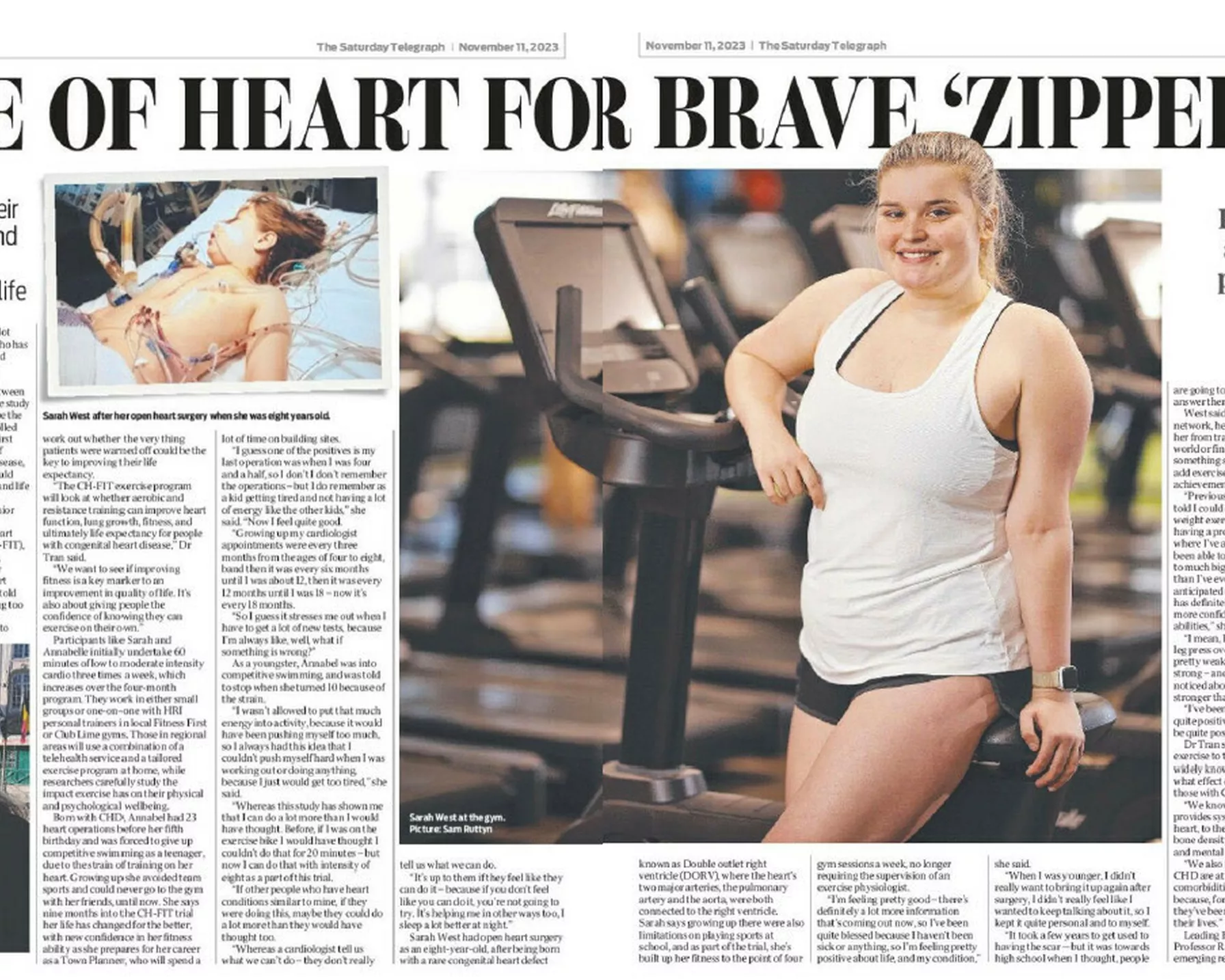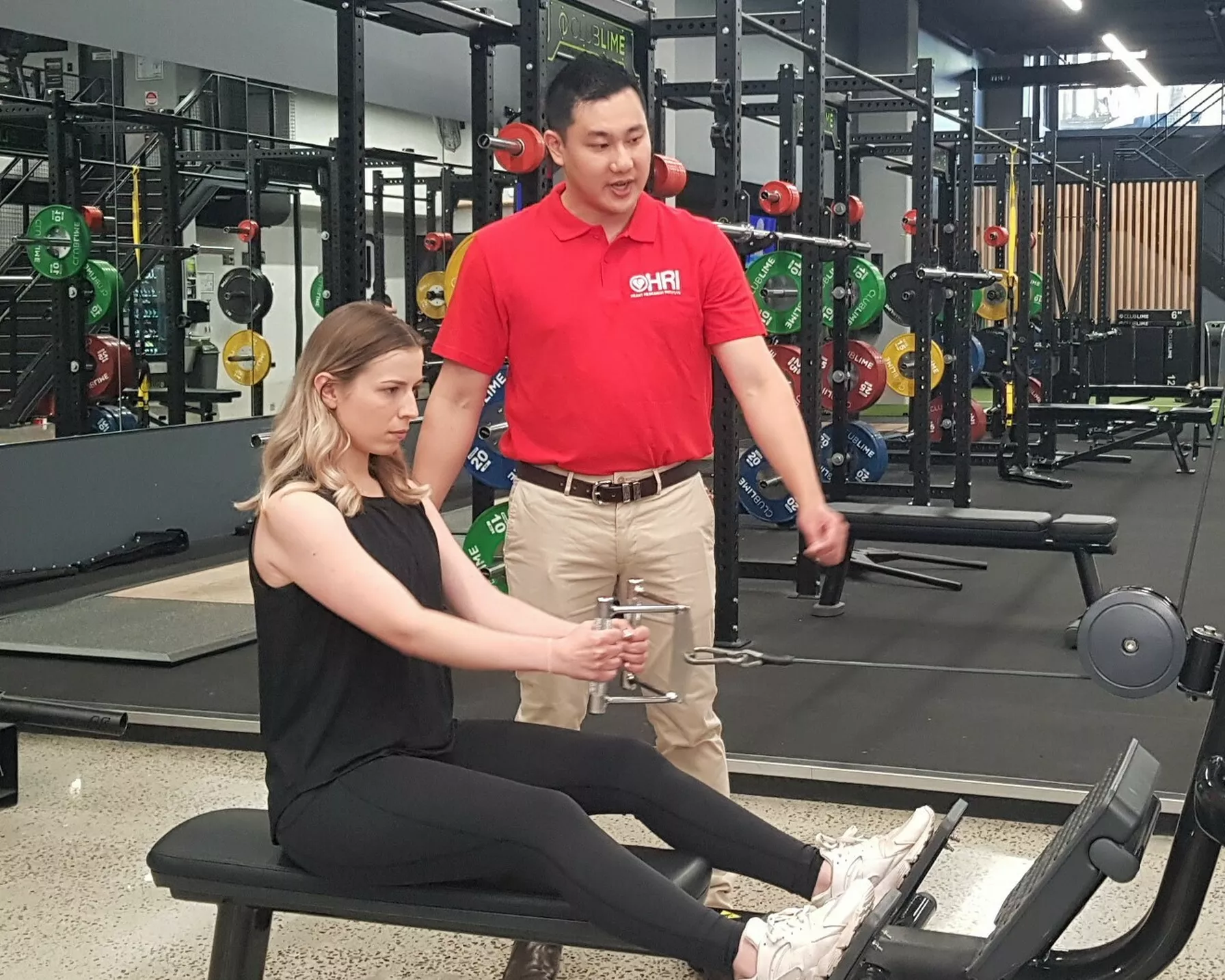
The Heart Research Institute’s (HRI’s) world-first exercise trial for patients with congenital heart disease (CHD) is already seeing positive results, with participants reporting increased energy and reduced anxiety while being active.
The Congenital Heart Fitness Intervention Test (CH-FIT) study, led by Assoc Prof Rachael Cordina and Dr Derek Tran within renowned cardiologist Prof David Celermajer’s research group, was launched 10 months ago with patients aged between 10 and 55 years of age initially recruited in New South Wales.
The project, which is expanding across the country, is the largest ever randomised trial in this cohort to investigate the role of exercise for CHD, with early results showing it could drastically improve both lives, and life expectancy.
Dr Tran said that until recently, people born with half a heart or single-ventricle CHD (Fontan-CHD) were told not to exercise for fear of putting too much strain on their heart.
But now that theory is being flipped on its head, as researchers work to determine whether regular exercise could be the key to improving the life expectancy of CHD patients.
“It is great news for patients, our partner, the Royal Prince Alfred Hospital (RPA), and HRI,” said HRI’s Scientific Director and CEO, Prof Andrew Coats AO. “It is particularly pleasing for me personally, as I did the first ever study of exercise training in heart failure 34 years ago.
“Now David and Rachael’s team have shown it also works in severe congenital heart disease, overturning decades of negativity to this idea. Fantastic!”
According to Prof Coats, “Although CHD carries a distinct series of problems for affected patients, we have learned much over many years, and part of this is that changes in other organs can severely affect the CHD patient, ie, it is not all about the heart.
“In this way it is reminiscent of heart failure, which damages and affects almost every organ system in the body.
The article in the Saturday Telegraph.
The study is already receiving prominent media coverage, including a large double-page spread in the Saturday Telegraph in NSW.
For people like Nicole, Annabel and Elle, who were told they couldn't exercise growing up, taking part in the study has already had a very powerful effect.
Born with CHD, Annabel Turner, 21, from Five Dock in Sydney, was only two hours old when she had her first surgery. By the time she turned five, she had endured 23 heart operations.
She was forced to give up competitive swimming as a teenager, due to the strain of training on her heart. Growing up she avoided team sports and could never go to the gym with her friends, until now.
Ten months into the CH-FIT trial, her life has changed for the better.
“It’s also helping me sleep better at night.”
Sarah West, who had her first open heart surgery at eight (left), is one of the patients who has benefited from the CH-FIT trial.
Sarah West, 27, from Campbelltown, was born with a rare congenital heart defect known as double outlet right ventricle (DORV). She had her first open heart surgery when she was eight. Sarah can recall having to be careful at school sports events, like the cross country, and being nervous about her physical capabilities.
As part of the trial, Sarah has built her fitness to the point of confidently attending three to four gym sessions a week, and no longer needing the supervision of an exercise physiologist.
“It’s really helped me with my confidence, and I have progressed up weights. I can now leg press 170 kilos,” she explains. “I really wanted to know the exact numbers that I’m capable of, not just being told to only do ‘light weights’ as I was previously.
“I’m stronger than I anticipated and have learnt a lot about myself. The trial has been so positive for me, so hopefully, it’ll be quite positive for other people too.”
Elle Pendrick has had five open heart surgeries and is also taking part in the CH-FIT trial.
For 40-year-old Elle Pendrick, who was also born with complex CHD, the exercise sessions she has been doing over Zoom have been “life-changing”.
“After my first few months of exercise, I was fitter, faster, and smarter! Since then, I’ve kept up the exercise in small classes led by university-trained exercise physiologists who understand CHD,” she said, adding that connecting with other adults with CHD has brought her a lot of joy.
“Doing squats when you’re hearing about other people’s journey or having a laugh about things only someone else with CHD can know meant the world to me!
Senior Exercise Physiologist Dr Derek Tran guiding a participant in the trial through some tailored exercises.
Leading HRI cardiologist Assoc Prof Cordina said emerging research suggests exercising could be more important for people with even the most complex types of CHD, because it has special effects on the circulation.
“People living with half a heart have no heart pump to push blood up through the lungs, so they rely heavily on the exercising muscles in the body – but there is hardly any research to understand the true impact of exercise on these special circulations and how to safely implement exercise training,” said Assoc Prof Cordina.
“Historically, people with CHD were not expected to survive to adulthood, and exercise was discouraged fearing too much stress on the heart. A whole generation of children has grown up consciously not exercising, putting themselves at risk of obesity through their inactivity.
“Some have developed into adults who are very unfit and don't meet anywhere near the physical activity recommendations for the general population,” she said.
There are 1,600 people living with Fontan-CHD – or ‘half a heart’ – in Australia and New Zealand, and over 100,000 living with other types of complex CHD. Assoc Prof Cordina said the research gave families and young people with CHD hope.
“It’s a hope for a bright future that we just didn’t have in the past, and I think that’s the most empowering thing science can do,” she said.
The CH-FIT trial is still looking to recruit CHD patients in other parts of Australia. If you are interested in signing up for the study, complete this online registration form.
Participants initially undertake 60 minutes of low to moderate intensity cardio three times a week.
They work in either small groups or one-on-one with HRI personal trainers in local Fitness First or Club Lime gyms. Those in regional areas will use a combination of a telehealth service and a tailored exercise program at home, while researchers carefully study the impact exercise has on their physical and psychological wellbeing.
Register for CH-FIT patient trial
Other media
Daily Telegraph online, Change of heart for brave ‘Zipper kids’ as new study turns traditional thinking on its head, 10 November 2023.
The New Daily, Heart patients hit the gym to dispel exercise warning, 27 November 2023 (AAP syndication across 40 publications).
Related research areas








